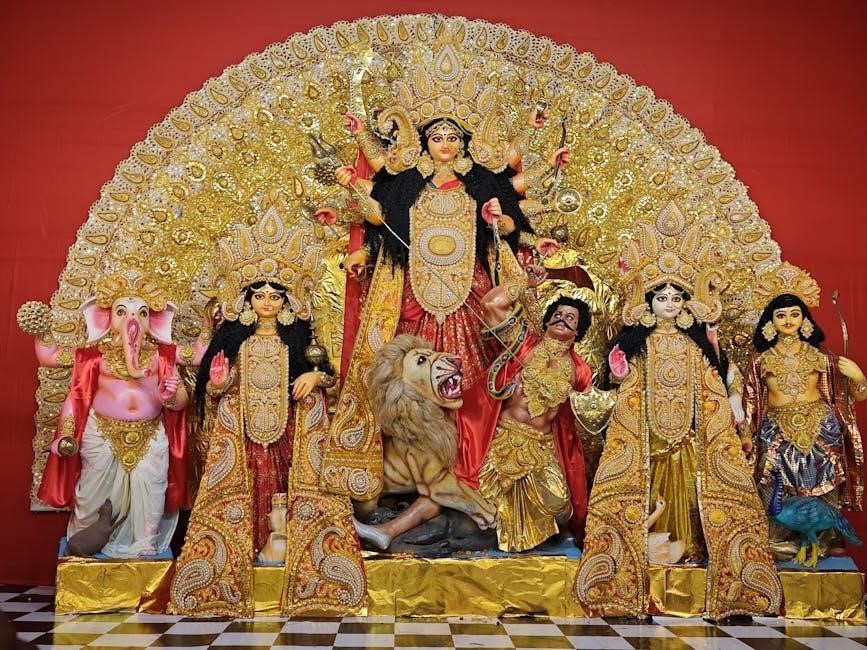
The Ashta Lakshmi Stotram is a revered Hindu prayer dedicated to the eight divine forms of Goddess Lakshmi, symbolizing prosperity, wealth, and spiritual growth.
Significance of the Stotram
The Ashta Lakshmi Stotram holds immense spiritual significance as it invokes the eight divine forms of Goddess Lakshmi, embodying prosperity, wealth, and enlightenment. It is a powerful prayer that seeks blessings for material and spiritual well-being. Chanting this stotram is believed to bring harmony, success, and good fortune. The Telugu version of the stotram is widely revered and easily accessible in PDF format, making it a popular choice for daily worship and special occasions. Its verses are deeply rooted in Hindu tradition and are cherished for their devotional and cultural value.
Overview of the Eight Forms of Lakshmi
The Ashta Lakshmi Stotram reveres eight divine forms of Goddess Lakshmi, each embodying distinct aspects of prosperity and well-being. These forms include Adi Lakshmi (the primal energy), Dhanya Lakshmi (wealth of grains), Dhairya Lakshmi (courage), Gaja Lakshmi (strength), Santana Lakshmi (progeny), Vijaya Lakshmi (victory), Vidya Lakshmi (knowledge), and Dhana Lakshmi (material wealth). Each form symbolizes a unique facet of divine grace, ensuring a balanced and fulfilling life for devotees. The stotram intricately describes these forms, highlighting their significance in both spiritual and material realms.
Structure of the Ashta Lakshmi Stotram
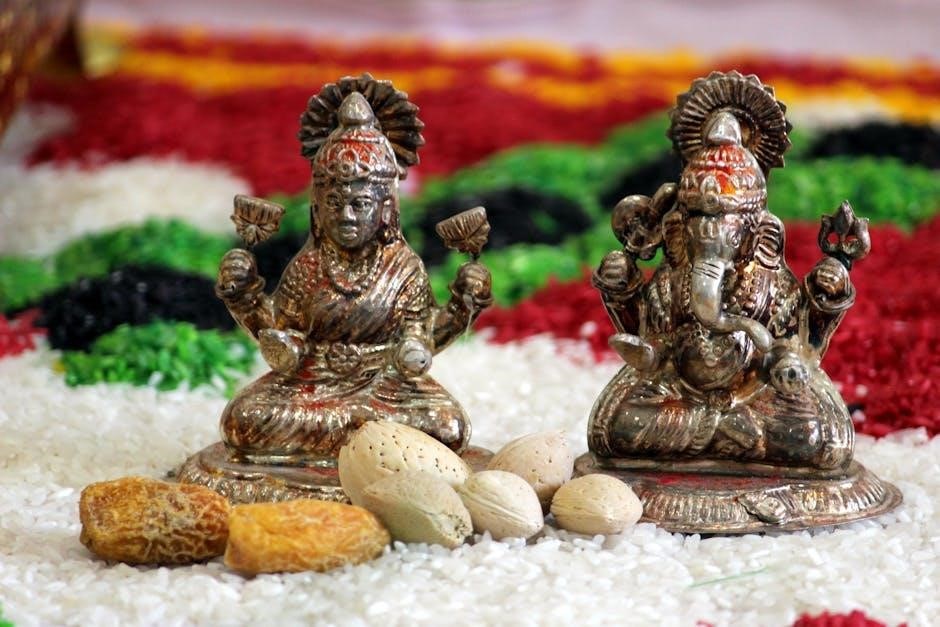
The Ashta Lakshmi Stotram consists of eight verses, each glorifying a distinct form of Goddess Lakshmi. Its structure is simple yet profound, ensuring deep spiritual resonance.
Number of Verses and Their Meaning
The Ashta Lakshmi Stotram comprises eight verses, each dedicated to a distinct form of Goddess Lakshmi. These verses are rich in spiritual significance, offering devotion and worship to the divine forms. Each verse highlights the unique attributes and blessings of Lakshmi, such as prosperity, wisdom, and strength. The verses are structured in a way that invokes her grace and ensures a life filled with abundance and harmony. Chanting these verses is believed to bring spiritual and material fulfillment to the devotee.
Language and Script in the Telugu Version
The Ashta Lakshmi Stotram in Telugu is composed in classical Telugu language, using the Telugu script. The PDF versions available online preserve the traditional script, making it accessible for devotees to read and chant. The Telugu script’s intricate design and cultural significance enhance the spiritual experience of reciting the stotram. This version is widely popular among Telugu-speaking communities, ensuring the prayer’s reach and relevance in their religious practices.
The Eight Forms of Lakshmi
The Ashta Lakshmi Stotram honors Goddess Lakshmi’s eight divine forms, each symbolizing distinct aspects of wealth, prosperity, and spiritual enlightenment, as detailed in the Telugu PDF version.
Adi Lakshmi
Adi Lakshmi, the original and eternal form of Goddess Lakshmi, embodies divine wisdom and prosperity. She is often depicted with four arms, symbolizing her power to grant spiritual and material wealth. As the consort of Lord Vishnu, she represents cosmic order and balance. Worshiping Adi Lakshmi is believed to bring enlightenment, peace, and prosperity. Her verses in the Telugu PDF highlight her as the source of all creation and the remover of ignorance, making her a central figure in the Ashta Lakshmi Stotram.
Dhanya Lakshmi
Dhanya Lakshmi is the goddess of agricultural wealth and fertility, often depicted holding a sheaf of grain. She symbolizes nourishment and abundance, ensuring food security and prosperity. Worshiping Dhanya Lakshmi is believed to bless devotees with a bountiful harvest and material wealth. Her presence in the Ashta Lakshmi Stotram highlights the importance of gratitude for nature’s bounty and the sustenance it provides. Her blessings are sought for a thriving agricultural life, good health, and overall family well-being.
Dhairya Lakshmi
Dhanya Lakshmi is the goddess of agricultural wealth and fertility, often depicted holding a sheaf of grain. She symbolizes nourishment and abundance, ensuring food security and prosperity. Worshiping Dhanya Lakshmi is believed to bless devotees with a bountiful harvest and material wealth. Her presence in the Ashta Lakshmi Stotram highlights the importance of gratitude for nature’s bounty and the sustenance it provides. Her blessings are sought for a thriving agricultural life, good health, and overall family well-being.
Gaja Lakshmi
Gaja Lakshmi, the fourth form, is often depicted with elephants, symbolizing royal wealth and strength. She is revered as the goddess who grants elephants, representing abundant wealth and prosperity. Worshiping Gaja Lakshmi is believed to bestow devotees with material wealth, courage, and wisdom. Her blessings are sought for overcoming obstacles and achieving success in endeavors. She embodies the power of prosperity and is often invoked for a life filled with strength, wisdom, and good fortune. Her presence in the stotram highlights her role in granting worldly comforts and spiritual growth.
Santana Lakshmi
Santana Lakshmi, the fifth form, is revered as the goddess of progeny and family harmony. She is often depicted with children, symbolizing her blessings for a fruitful and joyful family life. Worshiping Santana Lakshmi is believed to grant devotees healthy children, strong familial bonds, and the continuation of lineage. Her presence in the stotram emphasizes the importance of family and the divine grace required for raising children. She is also associated with the divine family of Lord Vishnu and Goddess Lakshmi, embodying the ideals of a harmonious household.
Vijaya Lakshmi
Vijaya Lakshmi, the sixth form, embodies victory and success. She is often depicted holding a sword and shield, symbolizing her power to vanquish obstacles and grant triumph. Worshiping Vijaya Lakshmi is believed to bestow courage, determination, and success in all endeavors. She is particularly revered for her ability to remove challenges and ensure victory in both personal and professional life. Her blessings are sought by devotees seeking strength and resilience to overcome adversity and achieve their goals.
Vidya Lakshmi
Vidya Lakshmi is the embodiment of knowledge and education. She is often depicted holding a book, symbolizing her role in enlightening the mind. Worshiping Vidya Lakshmi is believed to grant wisdom, academic success, and intellectual growth. She is revered for her ability to dispel ignorance and bestow clarity of thought. Her blessings are sought by students and scholars seeking excellence in their pursuits. Vidya Lakshmi represents the power of knowledge in achieving both personal and societal prosperity, making her a vital form of Goddess Lakshmi.
Dhana Lakshmi
Dhana Lakshmi is the form of Goddess Lakshmi associated with material wealth and financial prosperity. She is often depicted holding a golden pot filled with coins, symbolizing her role in granting abundance and riches. Worshiping Dhana Lakshmi is believed to bring stability, prosperity, and success in financial endeavors. Her blessings are sought for overcoming monetary challenges and achieving a comfortable life. Dhana Lakshmi embodies the divine energy that fosters economic growth and security, making her a revered form of Lakshmi in everyday life and spiritual practices.
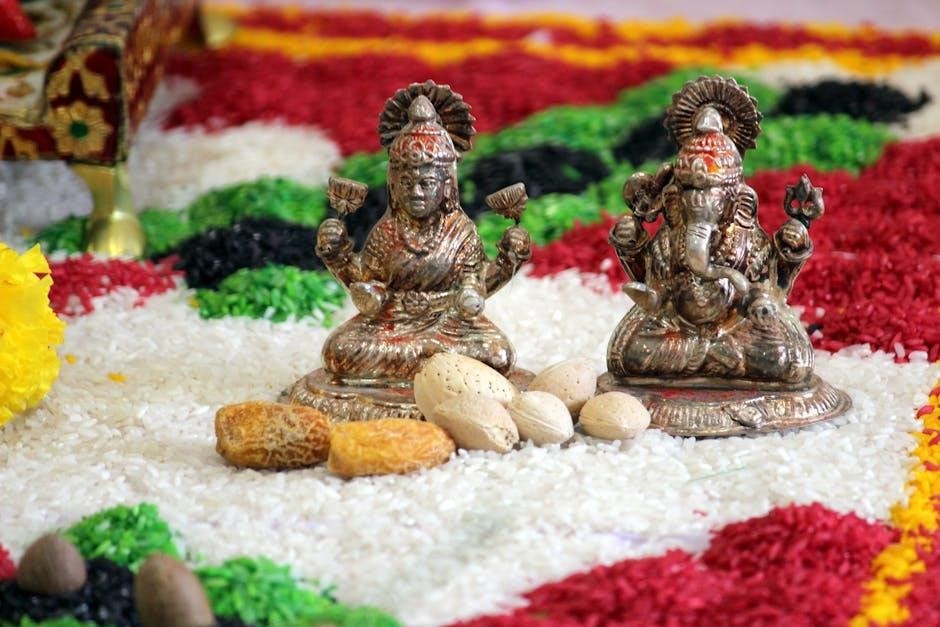
Benefits of Chanting the Ashta Lakshmi Stotram
Chanting the Ashta Lakshmi Stotram brings spiritual and material prosperity, fostering peace, wealth, and positive energy. It enhances devotion and invokes Goddess Lakshmi’s blessings for a fulfilling life.
Spiritual and Material Prosperity
Chanting the Ashta Lakshmi Stotram fosters both spiritual and material prosperity. It invokes Goddess Lakshmi’s blessings, granting wealth, peace, and divine grace. The hymn’s verses align one’s soul with cosmic energy, promoting harmony and success. Regular recitation strengthens faith, dispels negativity, and attracts positivity. It is believed to fulfill desires, enhance wisdom, and bring balance to life. This ancient prayer is a powerful tool for those seeking enlightenment and worldly comforts, embodying the essence of divine prosperity and spiritual growth.
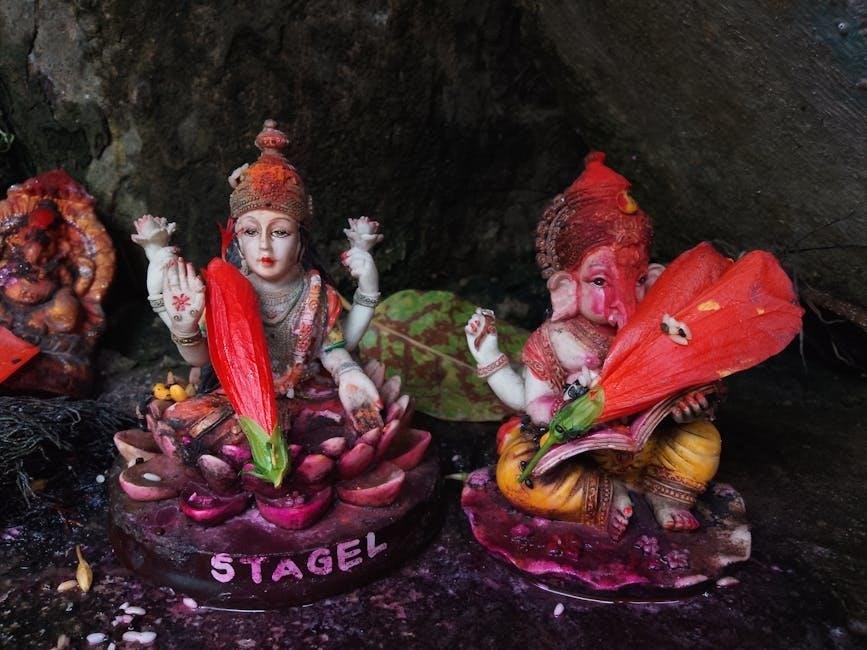
Health, Wealth, and Happiness
Chanting the Ashta Lakshmi Stotram is believed to bestow health, wealth, and happiness. It attracts positive energies, ensuring well-being and prosperity. The hymn’s verses promote emotional balance, physical health, and material success. By worshiping the eight forms of Lakshmi, devotees seek blessings for a joyful life, free from suffering. Regular recitation fosters a harmonious existence, enhancing overall quality of life and nurturing a sense of fulfillment. This prayer is a timeless remedy for achieving holistic happiness and divine grace.
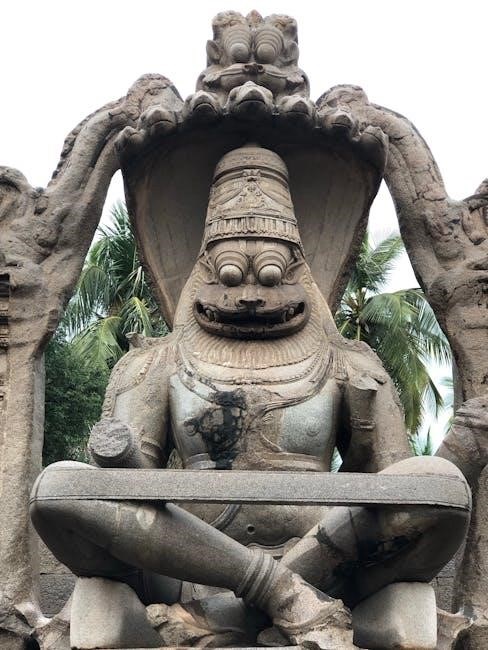
Downloading the Ashta Lakshmi Stotram in Telugu PDF
The Ashta Lakshmi Stotram in Telugu PDF is easily accessible online. It is available on various devotional websites, allowing devotees to download and chant it conveniently for spiritual benefits.
Available Platforms and Sources
The Ashta Lakshmi Stotram in Telugu PDF can be downloaded from various platforms like stotranidhi.com, telugudevotionalswaranjali.blogspot.com, and other devotional websites. It is also available on APKPure for easy access. The document is free to download and includes the complete Telugu lyrics and script. Many platforms offer it in both PDF and text formats, making it convenient for users to read or print. Additionally, some websites provide the stotram with meanings, enhancing its spiritual value for devotees seeking prosperity and enlightenment.
Steps to Download and Use the PDF
Visit reliable platforms like stotranidhi.com or telugudevotionalswaranjali.blogspot.com.
Search for “Ashta Lakshmi Stotram Telugu PDF” on the website.
Select the desired document from the search results.
Click the download link to save the PDF.
Open the PDF using a PDF reader to view or print the stotram.
Use it for chanting or reference, enhancing your spiritual practice with ease.